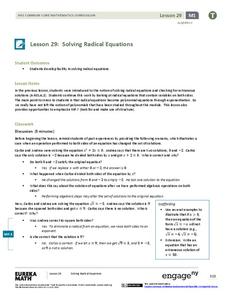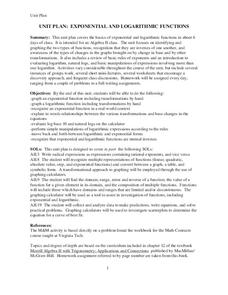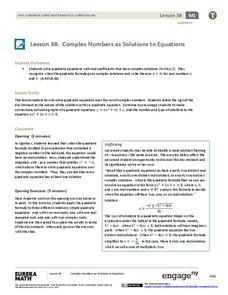McGraw Hill
Adding and Subtracting Radicals
Help remove some of the confusion surrounding the addition and subtraction of radical numbers with this set skills practice problems. Taken straight from the pages of a math text book, this resource provides learners with...
EngageNY
Multiplying and Dividing Expressions with Radicals
That's radical! Simplifying radicals may not be exciting, but it is an important skill. A math lesson provides explanations of properties used throughout the material. Scholars practice skills needed to multiply and divide...
EngageNY
Adding and Subtracting Expressions with Radicals
I can multiply, so why can't I add these radicals? Mathematicians use the distributive property to explain addition of radical expressions. As they learn how to add radicals, they then apply that concept to find the perimeter of...
EngageNY
Solving Radical Equations
Learners solve complex radical equations. Solutions vary from one, two, and none, allowing pupils to gain experience solving a variety of problems.
Cabrillo College
Elementary Algebra
Hello Algebra! If you're in need of a resource with a books worth of examples and practice problems, this is it. Some topics include linear equations, polynomials and exponents, rational expressions, quadratic equations, and a...
Rice University
Intermediate Algebra
Algebra concepts are all wrapped up in one nice bow. The resource combines all the concepts typically found in Algebra I and Algebra II courses in one eBook. The topics covered begin with solving linear equations and move to linear...
Virginia Department of Education
Radical Equations
Provide students with the skill for how to examine algebraic and graphical approaches to solving radical equations. Learners solve various radical equations involving square root and cube root expressions. They first solve...
Math Guy
Algebra 2 Practice Final
Work out to Algebra II with the 50-question activity that practices different types of functions. Multiple choice questions focus on topics such as rational, radical, and logarithmic functions. The resource comes with a printed answer...
Math Guy
Algebra 1 Practice Final
What makes this resource special? The amazing answer key that comes with worked out solutions and notes for each problem. Practice problems include all topics ranging from linear systems to simplifying exponential expressions. The...
Rice University
College Algebra
Is there more to college algebra than this? Even though the eBook is designed for a college algebra course, there are several topics that align to Algebra II or Pre-calculus courses. Topics begin with linear equation and inequalities,...
Flipped Math
Calculus AB/BC - Selecting Procedures for Determining Limits
Knowing more strategies is always a plus. Pupils watch an engaging video to learn additional ways to algebraically determine the limit of a function at a specified value. The video covers multiplying radical expressions by their...
EngageNY
Radicals and Conjugates
Make the irrational rational again! Continuing the theme from previous lessons in the series, the lesson relates the polynomial identity difference of squares to conjugates. Learners develop the idea of a conjugate through analysis and...
EngageNY
Polynomial, Rational, and Radical Relationships
This assessment pair goes way beyond simple graphing, factoring and solving polynomial equations, really forcing learners to investigate the math ideas behind the calculations. Short and to-the-point questions build on one another,...
Raytheon
Simplifying and Combining Algebraic Expressions
In this simplifying and combining algebraic expressions worksheet, students solve 100 problems that simplify monomials, radicals and rational expressions, solve 38 problems combining expression, then solve 40 questions in a test of...
West Contra Costa Unified School District
Fractional Exponents
Wow! Here is a handout packed full of tips and worked-out solutions to supplement instruction on fractional exponents. The lesson introduces and thoroughly explains the Algebra II concept, and closes with a...
Alabama Learning Exchange
Imaginary Numbers? What Do You Mean Imaginary?
Don't worry, this resource actually exists. Scholars learn about imaginary numbers and work on problems simplifying square roots of negative numbers. As an extension, they research the history of imaginary numbers.
Virginia Tech
Unit Plan: Exponential and Logarithmic Functions
A six-day unit for algebra II on exponential and logarithmic functions builds upon Chapter 12 of Merrill Algebra II with Trigonometry; Applications and Connections. The text provides assistance in the depth of instruction...
EngageNY
Criterion for Perpendicularity
The Pythagorean Theorem is a geometry pupil's best friend! Learners explain the equation a1b1 + a2b2 = 0 for perpendicular segments using the Pythagorean Theorem. They are able to identify perpendicular segments using their...
Inside Mathematics
Magic Squares
Prompt scholars to complete a magic square using only variables. Then they can attempt to solve a numerical magic square using algebra.
EngageNY
Simplifying Square Roots
Explore the process of simplifying square roots through an analysis of perfect squares. The fourth instructional activity of 25 expects individuals to find the perfect square factors in each radicand as a means of simplifying. The...
EngageNY
A Focus on Square Roots
Pupils learn to solve square root equations and rationalize denominators. Problems include those with extraneous solutions.
EngageNY
Graphing Cubic, Square Root, and Cube Root Functions
Is there a relationship between powers and roots? Here is a lesson that asks individuals to examine the graphical relationship. Pupils create a table of values and then graph a square root and quadratic equation. They repeat the process...
EngageNY
Complex Numbers as Solutions to Equations
Quadratic solutions come in all shapes and sizes, so help your classes find the right one! Learners use the quadratic formula to find solutions for quadratic equations. Solutions vary from one, two, and complex.
Alabama Learning Exchange
Exponents and Division
Create a human fraction to learn about division of exponents. Scholars develop the rule for division of exponents by being part of a human fraction to explore and justify the rule. They also consider zero exponents and negative exponents.























